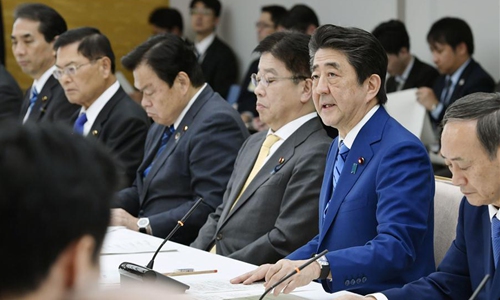Defense white paper shows Tokyo’s prudence between Beijing, Washington
Source: Global Times Published: 2020/7/15 22:53:40

Japanese Prime Minister Shinzo Abe. Photo: Xinhua
Japan's Ministry of Defense on Tuesday issued a defense white paper. China has been a country Japan has attached great importance to in its defense white papers and this one is no exception. This year's paper continues its cliché about China.
It continues to criticize China's legitimate military operations in the surrounding sea areas, airspace of Japan, and the South China Sea. On Diaoyu islands, it said that China has "relentlessly" continued unilateral attempts to alter the islands' status quo.
When it comes to the novel coronavirus pandemic, the white paper said, "while actively providing medical goods and dispatching medical experts to countries where the infection is spreading, China has been making propaganda efforts in various manners, including the spread of disinformation."
Tokyo has recently played tricks on the Diaoyu Islands. For example, Japan's Ishigaki Municipal Assembly approved a bill to change the Diaoyu Islands' administrative designation, which China firmly opposed. Tokyo also lodged its diplomatic protests with Beijing over China Coast Guard vessels' normal operations near the Diaoyu Islands. By virtue of the publication of the defense white paper, Japan may hope to express its dissatisfaction with China's moves on the Diaoyu Islands issue. Japan pays great attention to the islands and wants to sound louder in order to protect its security interests.
In the initial stage of the COVID-19 outbreak, Japan spoke highly of China's positive achievements in the fight against the virus. The two countries engaged in extensive cooperation to jointly fight COVID-19. However, Japan later shifted comments about China's successful measures - these were partly because of pressure from the US.
Washington has groundlessly slandered China's effective work against the virus. The US does not want to see China closely cooperate with Japan, a vital anchor for Washington to deal with Beijing. Therefore, Washington may have repeatedly put pressure on Tokyo to keep a distance from Beijing during this crucial period.
Tokyo's blame over China's military operations and Beijing's work in coping with COVID-19 may also be a pretext for Tokyo to increase its defense budget and enhance the capability of the Self-Defense Forces. Prime Minister Shinzo Abe has been active in revising Article 9 of the Japanese Constitution to add a provision to recognize the Self-Defense Forces. Emphasizing imagined threats from China could be a public relations offensive to whip the Japanese public up into supporting this.
Washington has stepped up its accusations and actions toward Beijing over issues such as the Taiwan question and the South China Sea issue. The US will continue to lean heavily on Japan to deter China by stirring up flash-points. A case in point: Japan may strengthen its patrol in waters surrounding the Diaoyu Islands.
As a close ally of the US, Japan has to coordinate with the US' strategy to suppress China. In this way, it can also seek its own interests. Undermining China's status in East Asia to boost Japan's regional status is Tokyo's actual objective.
But joining the US may not always be consistent with Japan's intent. For example, Japan used to be prudent over China's Hong Kong affairs, as it worried that making public statements on Hong Kong could influence overall China-Japan ties.
When riots raged in Hong Kong in 2019, Japan seldom commented. But when it comes to the national security law for Hong Kong, Japan joined the chorus of the other six members of the Group 7. In June, the foreign ministers of G7 made a statement accusing the law of undermining the "one country, two systems" principle and the territory's high degree of autonomy.
Japan is also fully aware of the great importance of maintaining cooperation and positive relations with China. Due to the pandemic, the global economy has been gravely hit. Against this backdrop, economic cooperation with China is very significant. Despite pressure from the US, Japan will try to avoid souring its relations with China.
The article was compiled by Global Times reporter Lu Yuanzhi based on an interview with Su Hao, founding director of the Center for Strategic and Peace Studies at the China Foreign Affairs University. luyuanzhi@globaltimes.com.cn
Posted in: VIEWPOINT